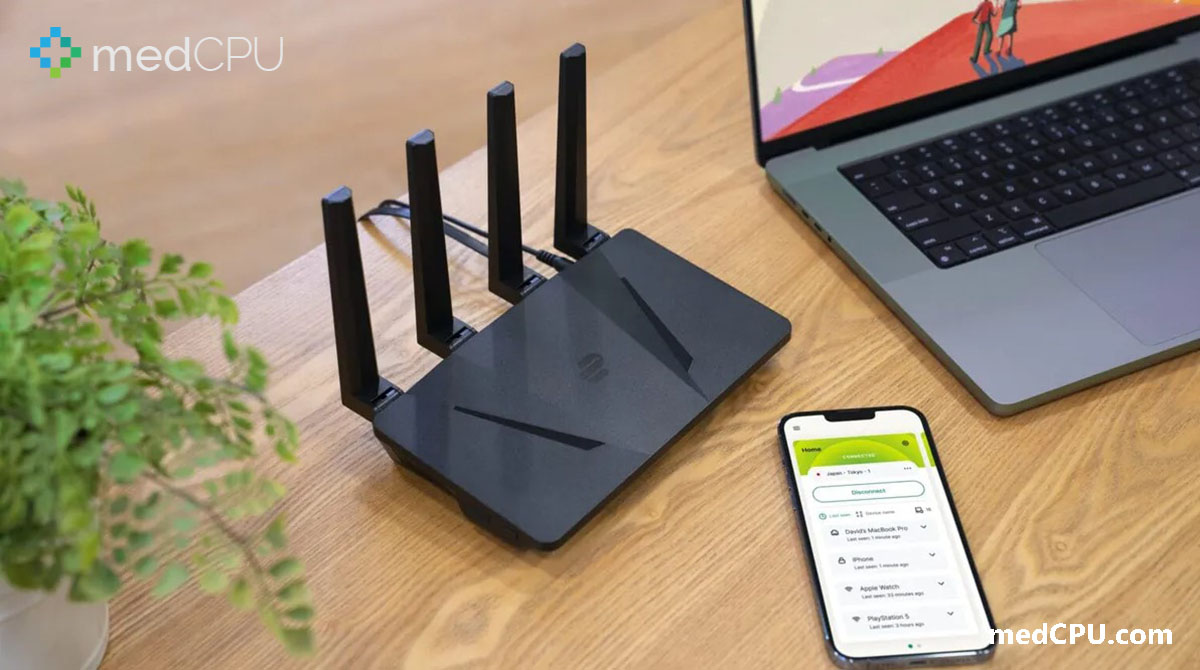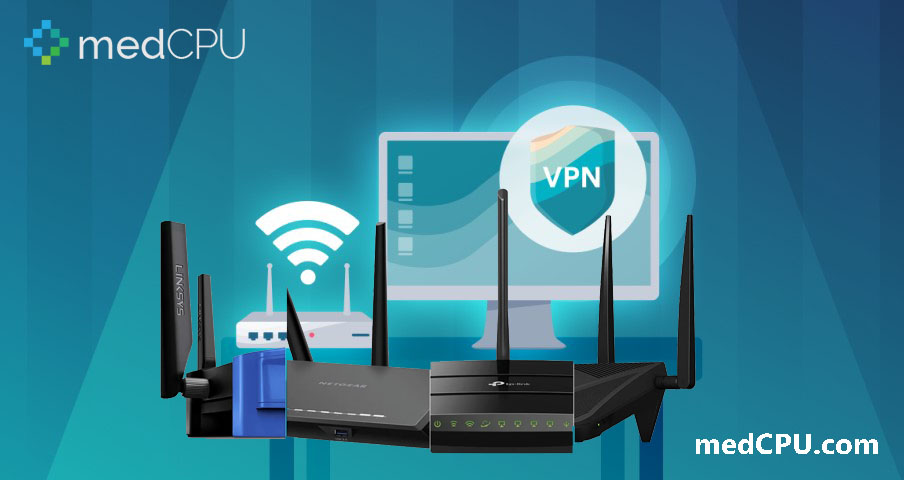Do you want to protect your privacy and security when surfing the internet? If so, you’ll need a virtual private network (VPN). A VPN can turn your router into a secure connection point between you and the internet. In this post, medCPU how to install a VPN on your router.
What is a VPN router?
A virtual private network (VPN) router is a device used to create a private network between two or more computers. VPN routers typically require an active VPN connection in order to function.
>>> Learn more: https://surfshark.com/surfshark-review
Why do you need a VPN router?
A VPN can offer a lot of benefits for users. While some of these benefits are easy to see and appreciate, others may not be as obvious. In this blog post, we will discuss some of the things a VPN can do to improve your online security.
First and foremost, a VPN can encrypt your data, so that even if someone were to intercept and read your traffic, they would not be able to understand the contents. This can help keep your data safe from prying eyes and unwanted097D.
A VPN can also prevent your online activity from being tracked. By routing your traffic through a VPN server, your ISP and other third-party monitors will not be able to see what websites you are visiting or what else you are up to online.
VPNs are also useful for people who are living in countries where the internet is tightly controlled. By using a VPN, you can bypass any filters that are in place and access the internet as if you were living in a more open and free society.
Overall, a VPN can offer a lot of benefits for users. If you are looking to improve your online security or access the internet in areas where it is censored or restricted, a VPN is a great option to consider.

>>> Read more: What is VPN? Why You Need A VPN
How does a VPN router work?
A VPN router works by redirecting all traffic entering and leaving your network through the VPN. This not only keeps you and your data safe but can also improve your internet speeds since all traffic will be traveling through the VPN instead of through your ISP.
Setting up a VPN on a router: Pros and Cons
Setting up a VPN on a router can help you keep your privacy while connected to the internet. However, there are some potential cons to consider before making the switch.
Pros of setting up a VPN on a router
There are many potential benefits to setting up a VPN on your router. chief among them is the protection it provides against filtered or public Wi-Fi networks. By connecting to a VPN server, you can bypass any filters and make sure that all of your online activity is private.
Another advantage to using a VPN on a router is the added security it provides. By connecting to a VPN server, you add an extra layer of security to your personal information. Not only will you be protected from data theft and identity theft, but you will also be ensured that your online activity is properly encrypted.
Cons of setting up a VPN on a router
There are also some potential drawbacks when it comes to using a VPN on a router. chief among them is the fact that a VPN on a router can slow down your overall internet speeds. Additionally, some routers do not have the ability to connect to VPN servers, meaning that a VPN would not be able to provide the added security that it is supposed to.
Finally, another downside to using a VPN on a router is the fact that it can be more difficult to stay connected to the VPN when away from home. If you are using your router to connect to a VPN server, it can be difficult to keep that connection active when you are away from your home network. In addition, some routers do not have an automatic way to reconnect to the VPN when you return.
How to install a VPN on your router
It’s easy to install a VPN on a router. To get started, you’ll need:
- A router
- A VPN service
- An internet connection
You can either buy a router with a VPN built-in, or you can buy a separate VPN router. If you’re planning on using a VPN with multiple devices, it’s a good idea to get a router with multiple Ethernet ports. This will allow you to connect different devices to the VPN at the same time.
How to install a VPN on your router
Most people use their routers to stay connected to the internet, but you can use your router to protect yourself from third-party spying and data theft. Here’s how to install a VPN on a router:
1. Choose your router.
There are many different types of routers, so you’ll need to choose one that’s compatible with the VPN you want to install. You can find VPNs for both routers and desktop computers, so it’s important to find the right one for your needs.
2. Connect your devices.
Now that you’ve chosen your router, you need to connect your devices to it. On your computer, open a browser and go to the website of the VPN you want to use.
3. Downloading and installing the VPN.
The VPN you choose will have a few different download options. In most cases, you’ll need to download a client program, which you can then install on your computer.
4. Connect to the VPN.
Now that you have the client installed, you need to connect to the VPN. On your router, open the configuration menu, and look for a section that says “VPN”.
5. Select the VPN connection.
If you’re using a VPN from a company like Netflix, Hulu, or Amazon, the connection process will be fairly simple. Just select the connection that corresponds to the VPN you’ve installed on your router.
6. Launch the VPN.
That’s all there is to it! Once you’ve installed the VPN, you can connect to it from any computer or device that has an internet connection. You’ll be able to protect yourself from third-party spying and data theft and have a more secure online experience.
Read video:
Can all routers use a VPN?
Many routers do not have VPN software pre-installed out of the box.
To check if your router supports VPN software, you can go to the manufacturer’s website and look for a guide on how to connect to the router using VPN software.
How To Fix A Router That Isn’t VPN-Compatible
If your router isn’t VPN-compatible, you may be able to fix the issue by following these steps:
1. Remove the firmware update.
2. Disable UPnP.
3. Change the router’s virtual interface to the MAC address.
Remove the firmware update.
If you’ve recently installed a firmware update on your router, you should remove it before continuing. This update may not be compatible with your VPN setup and may need to be removed in order for your router to be VPN-compatible.
Disable UPnP.
UPnP is a feature of many routers that allows devices on the network to share content and settings. By disabling UPnP, you may be able to fix the issue if your router isn’t VPN-compatible.
Change the router’s virtual interface to the MAC address.
If your router is using a virtual interface, you may be able to fix the issue by changing the virtual interface to a MAC address. This will prevent your router from using UPnP and may make your router VPN-compatible.

Tips to get the most out of your VPN router
Welcome to the world of VPNs! Whether you’re a techno-geek looking for a way to keep your data safe while you’re online, or you just want to keep your family safe while they’re browsing the web, a VPN is a great solution.
VPNs can protect your data in a variety of ways, from encrypting your traffic to providing a route out of your country if you need to stay tucked away while you’re on holiday. Here are a few tips to help you get the most out of your VPN router:
1. Choose the right VPN for your needs
When it comes to choosing a VPN, it’s important to understand what you need it for. For example, if you’re protecting your browsing data from prying eyes, a standard VPN won’t work very well. You’ll need a VPN that encrypts your traffic, which will protect your data from hackers and surveillance agencies.
2. Install the VPN software
Most VPNs come with free and premium versions. The premium version will usually offer more features, including password protection and automatic updates. Make sure you install the VPN software on your router before you start using it.
3. Use the VPN with caution
Be sure to use your VPN responsibly. While it can protect your data, using a VPN can also disable some of your network features, including your internet speed, if you’re not careful. Always keep an eye on your network performance while you’re using a VPN so you don’t end up putting your security at risk.
4. Keep your router up to date
Your VPN router is like your personal security guard. Make sure you keep it up to date with the latest security patches so you can stay protected from hackers.
5. Use the VPN when you need it
VPNs aren’t a replacement for regular security measures like antivirus software and a firewall. Use them when you actually need them and don’t depend on them to protect you all the time.

Eyal Ephrat serves as the co-founder and CEO of medCPU.com, where technology is making significant strides in the field of medicine. Through his experience in purchasing PC and laptop equipment and various other tech products, Eyal Ephrat contributes valuable insights to medCPU’s mission.
